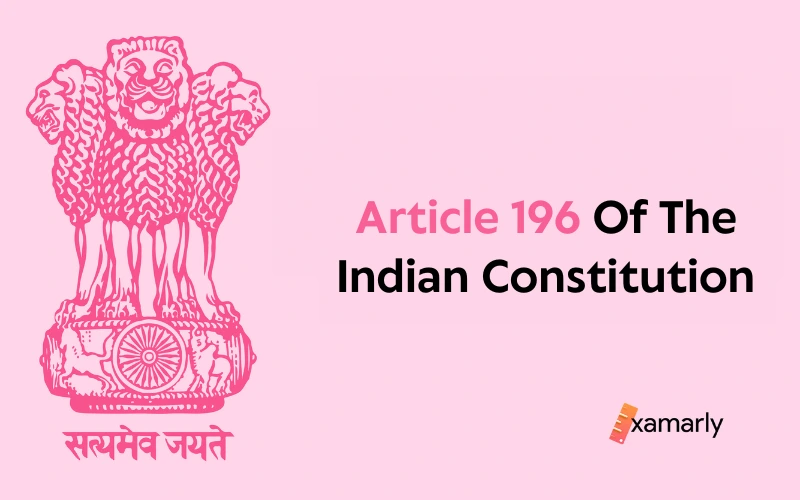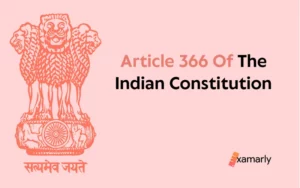An Overview
Democracy, in which all the major decisions rests on the elected leaders is one of the most preferable forms of governance that is being adopted by majority of the countries around the globe. India, as a nation is governed by a democratic form of government. It has its Constitution which paves way for provisions through the means of articles.
Article 196 Of the Indian Constitution deals with the legislative procedure of the introduction and passage of bills in the Legislature of a State. In simple words, this article traces the fate of a bill in the Houses of the State Legislature.
Since, this article is concerned with the legislative procedure, it is contained in Chapter III of the Indian Constitution. Furthermore, Chapter III is included in Part VI of the Indian Constitution.
Read on to gain an insight into this article and its provisions.
- An Overview
- Article 196 Of The Indian Constitution: Introduction Of Bills And Its Passing In The State Legislature
- Clause (1) of Article 196 Of The Indian Constitution: Explained
- Clause (2) of Article 196 Of The Indian Constitution: Explained
- Clause (3) of Article 196 Of The Indian Constitution: Explained
- Clause (4) of Article 196 Of The Indian Constitution: Explained
- Clause (5) of Article 196 Of The Indian Constitution: Explained
- Summing Up
- FAQs Related To Article 196 Of The Indian Constitution
Article 196 Of The Indian Constitution: Introduction Of Bills And Its Passing In The State Legislature
As stated above, Article 196 of the Indian Constitution falls under the category of articles revolving around the Legislative Procedures as mentioned in the official document of the Constitution of India.
The provisions of this article are provided for the introduction and the passing of bills in the Houses of the Legislature of a State. These provisions are held under five clauses, namely- clause (1), clause (2), clause (3), clause (4), and clause (5). It does not have any sub-clauses as such.
Let us now take up each clause one by one, analyse it closely and try to understand the provision it holds. The clauses have been quoted from the Constitution of India in the coming paragraphs.
Clause (1) of Article 196 Of The Indian Constitution: Explained
(1) Subject to the provisions of articles 198 and 207 with respect to Money Bills and other financial Bills, a Bill may originate in either House of the Legislature of a State which has a Legislative Council.
The first clause of Article 196 of the Indian Constitution states that Articles 198 and 207 provides certain provisions. Keeping those provisions in mind and relating it to the Money Bills and other Financial Bills, the clause says that a Bill may be introduced in either of the Houses of the Legislature of a State. The only point to be noted here is that it the State Legislature must have a Legislative Council, or otherwise known as the Vidhan Parishad for the introduction of a Bill.
Clause (2) of Article 196 Of The Indian Constitution: Explained
(2) Subject to the provisions of articles 197 and 198, a Bill shall not be deemed to have been passed by the Houses of the Legislature of a State having a Legislative Council unless it has been agreed to by both Houses, either without amendment or with such amendments only as are agreed to by both Houses.
The next clause of the article informs that a Bill shall not be considered to have been passed by the Houses of the Legislature of a State that has a Legislative Council until it has been given approval by both the Houses, that is the State Legislative Assembly as well as the State Legislative Council.
This is applicable either without any amendments to Bills or with revisions that have been given consent by both the Houses. This provision is subject to the provisions of articles 197 and 198 and applies only to States that have a Legislative Council.
Clause (3) of Article 196 Of The Indian Constitution: Explained
(3) A Bill pending in the Legislature of a State shall not lapse by reason of the prorogation of the House or Houses thereof.
The third clause of the article highlights that it is not permissible for a Bill that is currently being considered by the Legislature of a State to expire or lose its relevancy simply because the House or Houses that make up that Legislature, that is the Vidhan Parishad and the Vidhan Sabha have been adjourned.
The new Legislature Assembly that will be formed by the newly elected government will have the responsibility of taking up the consideration of Bills of this nature in their subsequent sessions.
Clause (4) of Article 196 Of The Indian Constitution: Explained
(4) A Bill pending in the Legislative Council of a State which has not been passed by the Legislative Assembly shall not lapse on a dissolution of the Assembly.
Clause (4) of Article 196 of the Indian Constitution clearly states that any Bill in the Vidhan Parishad, or the Legislative Council of a State that is still in consideration means that it has not been approved by the Vidhan Sabha, or the State Legislative Assembly. Such a Bill shall still be taken up for consideration even if the Legislative Assembly is dissolved.
Clause (5) of Article 196 Of The Indian Constitution: Explained
(5) A Bill which is pending in the Legislative Assembly of a State, or which having been passed by the Legislative Assembly is pending in the Legislative Council, shall lapse on a dissolution of the Assembly.
The ultimate clause clarifies the fate of a Bill that ultimately fails to receive assent under Article 196.
A Bill will fail to pass if the Legislative Assembly is dismissed and the said Bill is in waiting to be debated on in the Vidhan Sabha, or the Legislative Assembly of a State, or that was previously voted on in the Legislative Assembly and is now waiting to be considered on in the Legislative Council.
Summing Up
By delving deep into the provisions provide by the five clauses of Article 196 of the Indian Constitution, we learnt that this article defines the legislative procedure that is followed in the Legislature of a State in cases of introduction and the passing of a Bill.
We understood that the mutual agreement of both the Houses of the Legislature of a State, that is the State Legislative Council (Vidhan Parishad) and the State Legislative Assembly (Vidhan Sabha) is equally necessary for the Bill to transition into a law later on. We also got to know the different scenarios where the Bill will be considered to be either valid or void.
You Might Also Like:
| Article 192 Of The Indian Constitution | Article 193 Of The Indian Constitution |
| Article 194 Of The Indian Constitution | Article 195 Of The Indian Constitution |
FAQs Related To Article 196 Of The Indian Constitution
Which Articles Are Included In Part VI Of The Indian Constitution?
Articles 168 to 212 come under the purview of Part VI Of the Indian Constitution.
What Do Articles 168 To 212 Revolve Around?
Part VI Of The Indian Constitution holds articles 168 to 212. All of these articles deal with the State Legislature. These include provisions related to various aspects such as its composition, its presiding officers, their duration of service, the powers accorded on them, the privileges they enjoy, the special procedure for their appointment, disqualification, removal, etc.
How Many Types Of Bills Are A Part Of The Indian Constitution?
Under the Indian Constitution, we find mainly four types of bills. These are the Ordinary Bills, Money Bills, Financial Bills, and Constitutional Amendment Bills.
How Many Clauses Are There In Article 196 Of The Indian Constitution?
Article 196 Of The Indian Constitution provides constitutional provisions through five clauses, namely- clause (1), clause (2), clause (3), clause (4), and clause (5).






